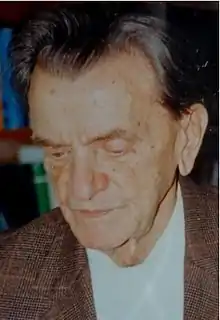Károly Simonyi
Károly Simonyi (18 October 1916 – 9 October 2001) was a Hungarian physicist and writer. He was professor of electrical engineering at Technical University of Budapest and the author of the popular tabletop book A Cultural History of Physics (A fizika kultúrtörténete, 1978).
Károly Simonyi | |
|---|---|
 | |
| Born | 18 October 1916 |
| Died | 9 October 2001 (aged 84) Budapest, Hungary |
| Nationality | Hungarian |
| Occupation | University professor |
| Notable work | A Cultural History of Physics |
| Spouse | Zsuzsa Simonyi |
| Children | Tamás Károly |
He is the father of Charles Simonyi, a prominent computer-software executive who oversaw the creation of Microsoft Office.[1]
Biography
Simonyi was born the seventh of ten children in a small village in western Hungary. Simonyi earned degrees respectively in engineering at the Technical University of Budapest and in law at the University of Pecs. Following World War II, he taught electrical engineering at the University of Sopron and in 1952 he became a professor at the Technical University, where he was known as an outstanding teacher and organized the Department of Theoretical Electrical Engineering.[2]
In the 1960s he lost his directorship at KFKI Physics Research Institute, his post as department head, and finally his professorial post due to the political climate in Hungary.[3] He then undertook writing the story of the history of physics and the cultural, philosophical, and societal movements that had shaped and been shaped by its development.[4]
Károly's paternal grandfather was Sándor Simonyi-Semadam, who, as prime minister in the aftermath of World War I, signed the Treaty of Trianon.
References
- Peter Weibel; Ludwig Múzeum; Neue Galerie am Landesmuseum Joanneum; Museum of Modern Art, Antwerp (2005). Beyond Art: A Third Culture : a Comparative Study in Cultures, Art, and Science in 20th Century Austria and Hungary. Springer. p. 351. ISBN 978-3-211-24562-0.
- "Simonyi, Károly". BME OMIKK. Retrieved 17 January 2013.
- In the foreword to the English edition of A Cultural History of Physics, his son Charles Simonyi states: "Yet, in the politically charged atmosphere of the 1960s in Hungary, his quasi-apolitical personal conduct, based on the age-old virtues of hard work, good character, and charity, was interpreted as political defiance that could not be countenanced by the state."
- Simonyi, Károly (2012). A Cultural History of Physics. A K Peters/CRC Press. ISBN 9781568813295.